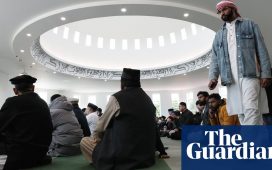The St Vincent de Paul Society has asked not to be “used” to promote a new Coalition proposal to allow “public benevolent institutions” to discriminate against prospective staff based on religion, stating that it has no need to do so for its commercial activities.
While unveiling a suite of changes to the government’s religious discrimination bill on Tuesday, attorney general Christian Porter cited Vinnies – a lay Catholic organisation which runs charity op-shops – as an example of an institution that would benefit from extending exemptions to allow religious organisations to preserve their “religious ethos”.
The new bill provoked a mixed reaction – it was praised by conservative religious groups, cautiously welcomed by employer groups which want further changes, and denounced by human rights, LGBTI groups and the Greens, which all warned it increases religious bodies’ powers to discriminate.
The Sydney Anglican church – which was one of the fiercest critics of the original bill among conservative churches – welcomed the bill, with archbishop Glenn Davies crediting the government for “[taking] seriously the deeply-held views of people of faith”
“In particular, I am encouraged by a number of changes in the second exposure draft,” he said.
“The respect given to faith charities is an important model for the future harmony of Australian society.”
The Australian Catholic Bishops Conference also welcomed the second draft bill.
But Claire Victory, the national president of the St Vincent de Paul Society, said that it “does not require employees and volunteers working in the society’s commercial activities to be Catholic”.
It had “never required this of people working in our shops” nor at its secretariat, she said.
“Certain roles within our conferences and councils which have particular responsibility for overseeing our mission and Catholic ethos are usually filled by Catholics but may also be filled by people who share basic Catholic beliefs.”
The Public Interest Advocacy Centre chief executive, Jonathon Hunyor, welcomed the “one positive, albeit limited change” – reducing the range of professions who are able to conscientiously object to providing health services and clarifying that the provision is not meant to allow refusal to particular people or groups of people.
The new bill will specify that it does not give a right to medical practitioners to discriminate against individuals based on gender or other characteristics.
Nevertheless, doctors, pharmacists and other limited categories of medical practitioners could refuse to perform certain procedures or dispense certain drugs – such as abortion or the morning after pill – provided they refused to do so for all patients.
Hunyor said he “remains concerned that this may still allow doctors, pharmacists and others to refuse to provide specific types of services, where those services are used most commonly, or even exclusively by people from particular groups – for example, by refusing to provide types of hormone treatment that benefit trans and gender diverse people”.
The chair of the Australian Medical Association ethics and medico-legal committee, Chris Moy, told the ABC that doctors “have an obligation to the patient in front of us” to treat or refer them for care and the AMA had an issue with the right to “walk away and not have anything to do with it” proposed by the original bill.
The right to conscientiously object creates “inconsistency” with ethical obligations “where it’s really not required”, he said.
Moy asked the government to consider scenarios such as “an individual needing a termination of pregnancy in a remote area with one health provider who suddenly says they have this conscientious objection”.
Just Equal spokesman Rodney Croome said the government had “heard the LGBTIQ community say we want the bill to allow less discrimination, and it gave us precisely the opposite”. He called on Labor leader Anthony Albanese to reject the bill.
Labor does not plan to elaborate on its position that the government should not “compromise existing anti-discrimination protections” unless and until the bill is introduced to parliament.
Hunyor said the second draft “widens the scope for religious organisations to discriminate when providing public (and publicly funded) services”.
“Religious schools, charities and other organisations are given an almost free license to discriminate against people who do not share their religious beliefs.
“Religious hospitals, aged care facilities and accommodation providers are allowed to fire, or refuse to hire, people simply because of their religious beliefs.”
The new bill will also narrow the so-called “Folau clause”, so that employers are prohibited from setting a rule that indirectly discriminates on religion only where the rule is “other than in the course of the employee’s employment”.
Porter said the change was meant to prohibit rules regulating what employees said in their “spare time” but allow employers to continue to regulate activities connected to work, such as office Christmas parties.
Australian Industry Group chief executive, Innes Willox, said the change “addresses a key concern” that it had raised in consultation but “more changes to the bill will be needed to address the genuine concerns of employers”.






